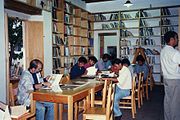Adult education
From Wikipedia, the free encyclopedia
| This article does not cite any references or sources. Please help improve this article by adding citations to reliable sources (ideally, using inline citations). Unsourced material may be challenged and removed. (November 2007) |
Adult education is the practice of teaching and educating adults. This often happens in the workplace, through 'extension' or 'continuing education' courses at secondary schools, at a college or university. Other learning places include folk high schools, community colleges, and lifelong learning centers. The practice is also often referred to as 'Training and Development'. It has also been referred to as andragogy (to distinguish it from pedagogy). A difference is made between vocational education, mostly undertaken in workplaces and frequently related to upskilling, and non-formal adult education including learning skills or learning for personal development.
Contents |
[edit] Characteristics
Educating adults differs from educating children in several ways. One of the most important differences is that adults have accumulated knowledge and experience that can add to or hinder the learning experience. Another difference is that most adult education is voluntary, therefore, the participants are generally better motivated.
Adults frequently apply their knowledge in a practical fashion to learn effectively. They must have a reasonable expectation that the knowledge recently gained will help them further their goals. One example, common in the 1990s, was the proliferation of computer training courses in which adults (not children or adolescents), most of whom were office workers, could enroll. These courses would teach basic use of the operating system or specific application software. Because the abstractions governing the user's interactions with a PC were so new, many people who had been working white-collar jobs for ten years or more eventually took such training courses, either at their own whim (to gain computer skills and thus earn higher pay) or at the behest of their managers.
In the United States, a more general example is that of the high-school dropout who returns to school to complete general education requirements. Most upwardly-mobile positions require at the very least a high school diploma or equivalent. A working adult is unlikely to have the freedom to simply quit his or her job and go "back to school" full time. Public school systems and community colleges usually offer evening or weekend classes for this reason. In Europe this is often referred to as "second-chance", and many schools offer tailor-made courses and learning programs for these returning learners.
Those adults who read at the very lowest level get help from volunteer literacy programs. These programs provide one to one tutoring and small group sessions for adults at the 6th grade level or below. Public libraries, nonprofit organizations and school systems administer these programs across the country. ProLiteracy Worldwide is the national organization which provides training, tutor certification and accreditation for local volunteer programs. States often have state organizations such as Literacy Florida!Inc.which provide field services for volunteer literacy programs.
In the U.S.A., the equivalent of the high school diploma earned by an adult through these programs is to pass the General Education Development (GED) test.
Another fast-growing sector of adult education is English for Speakers of Other Languages (ESOL), also referred to as English as a Second Language (ESL)or English Language Learners (ELL). These courses are key in assisting immigrants with not only the acquisition of the English language, but the acclimation process to the culture of the United States.
[edit] See also
- Adult high school
- Community college in Canada and the United States
- Community Education in Scotland
- Continuing education
- Distance learning
- E-learning
- Folk high school in Scandinavia and Germany
- Folkbildning community education through learning circles in Scandinavia
- Illiteracy
- Life skills
- Lifelong learning
- International Society for Comparative Adult Education
- Open University
- Post-secondary education for Aboriginal Canadians
- Part-Time Learner
- Scuola serale in Italy
[edit] Adult Education by geographic region
[edit] Historical adult education
[edit] Educators
[edit] Further reading
- Brookfield, Stephen: The Power of Critical Theory for Adult Learning and Teaching, Open University Press, 2005, ISBN 0335211321
- Brookfield, S. (1986). Understanding and facilitating adult learning. San Francisco: Jossey-Bass.
- Cranton, P. (2006). Understanding and promoting transformative learning: A guide for educators of adults (2nd ed.). San Francisco: Jossey-Bass.
- Crimaldi, Laura, "Older residents follow Pathway to college", Boston Herald, Sunday, January 4, 2009. About students successes in the College Pathways program at ABCD Learning Works in Boston, Massachusetts.
- Cross, K. P. (1981). Adults as learners. San Francisco: Jossey-Bass.
- Knowles, M. S., Holton, E. F, & Swanson, R. A. (2005). The adult learner (5th ed.). Burlington, MA: Elsevier.
- Lindeman, E. C. (1926). The meaning of adult education. New York: New Republic, Inc.
- Merriam, S. B., Caffarella, R. S., & Baumgartner, L. M. (2007). Learning in adulthood: A comprehensive guide (3rd ed.). San Francisco: Jossey-Bass.
- Rogers, Alan, "Non-formal Education: Flexible Schooling Or Participatory Education?", Springer, 2005. ISBN 0387246363
[edit] External links
- Adult Literacy Education - Wiki devoted entirely to adult education
- International Council for Adult Education (ICAE)
- European Association for the Education of Adults (EAEA)
- The Council for Adult and Experiential Learning
- UNESCO Institute for Lifelong Learning (UIL)
- National Center for the Study of Adult Learning and Literacy (NCSALL U.S.)
- Adult Education in Ireland
|
|||||


